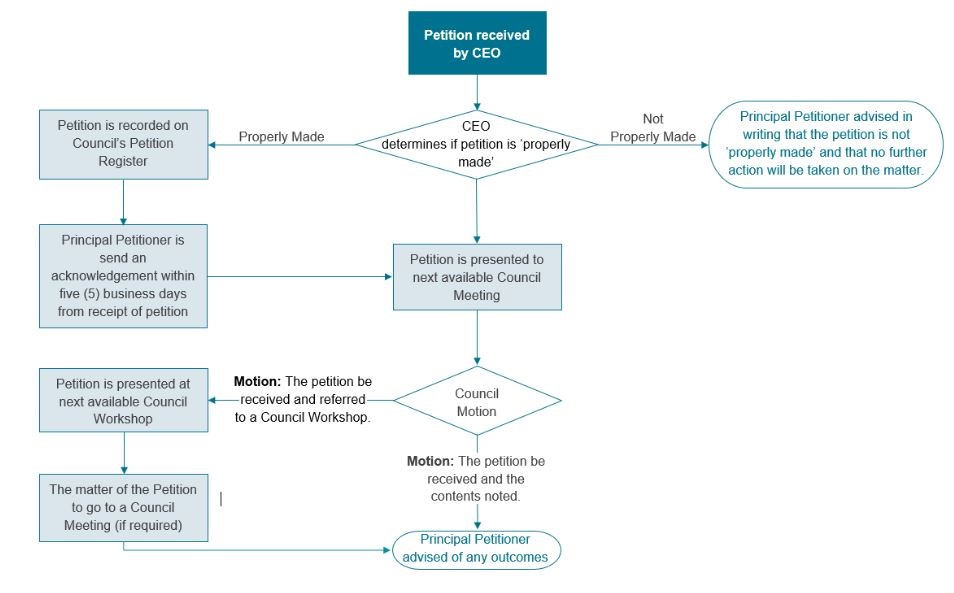The community can engage with Council through our meeting processes in the following ways:
Petitioning Council
A petition is a formal written request used to lobby a law-making body such as local government. It may request an amendment to general law or the review of an administrative decision. The petition is placed before the law-making body with the object of implementing the particular action or amendment. Petitioning is one of the traditional forms by which people can make requests direct to Council.
Petitions should not be used to request completion of operational works such as:
- having a water meter repaired
- requesting road repairs
Guidelines for Petitions
All petitions must meet the following requirements to be determined to be a property made petition for consideration by Council:
- Contain a clear and concise statement identifying the subject matter of the petition and the action sought from Council
- Include a statement specifying the range of numbered of pages to the petition and the total number of signatories
- Record a brief statement on each page of the subject matter and the action requested
- Contain the full printed name, address, phone number and signature of the person lodging the petition, or if acting on behalf of organisation/group, name of organisation/group
- List the names, addresses and signatures of those people who support the petition
- Be in the English language or accompanied by a translation certified to be a true and correct translation (including contact details of the translator)
- Be a standalone document with no letters, affidavits, or other documents attached
- Be respectful and not contain any offensive, defamatory, indecent or abusive language or substance or otherwise offend any rule or practice of Council
- Be clearly written or printed and be free from erasures or alterations
- Meet all stipulations
- Not be requests for grants of public money or remission of any duties
Petitions that do not meet the criteria listed above will be deemed invalid and will not be received by Council.
This sample petition(PDF, 57KB) may be used as a guide.
Signing a Petition
A petition must be signed by a minimum of ten (10) persons aged 18 years or older, clearly stating their name and address. Each person may not sign more than once and each signature must be an original written upon the petition itself and not pasted upon it or otherwise affixed or transferred to it (e.g. scanned, pasted, photocopied, etc.).
Persons signing the petition must only be signing on behalf of themselves and not acting as proxy for another person.
Addressing and Lodging the Petition
A person may lodge a petition with the Council by submitting the petition to an Isaac Regional Council Customer Service Centre in person, or by mail addressed to:
Chief Executive Officer
Isaac Regional Council
PO Box 97
Moranbah Qld 4744
Actioning a Petition
Once registered the petition will be forwarded to the CEO and the following process will apply.

If the petition lodged is not to be tabled, the Council will notify the person lodging the petition within twenty-one (21) days of lodgement, the reasons for it not being tabled.
If the petition is to be tabled, Council will advise the person lodging the petition, the date the petition is to be tabled.
Deciding a Petition
Council will decide what action, if any, it will take on the petition after the petition is tabled at its ordinary meeting.
In the minutes of the deciding meeting, Council will record the subject matter of the petition, the number of signatories to the petition, and what action, if any, it will take.
The Council will inform the person who has lodged the petition of Council's decision within twenty-one (21) days of the petition being tabled.
Petitioning other Levels of Government
Find out more about petitioning other levels of the Australian government:
Petition to House of Representatives - Federal government website
Petition to Senate - Federal government website
Petition to Queensland Parliament - State government website
Further information on Petitions to Council can be found in the Standing Orders and Meeting Procedures.(PDF, 523KB)
Deputations
Deputations are where an individual or a small group address Council on issues that are important to them. The address can be on any topic, it does not need to be in relation to an item on the Meeting agenda. Deputations from the public are welcome at Council's Ordinary Meetings. Deputations including question time are restricted to a maximum length of 30 minutes.
If you wish to make a deputation to a Council meeting, please complete the Deputation Request Form(PDF, 189KB) and forward to the Chief Executive Officer at records@isaac.qld.gov.au, via post to PO Box 97, Moranbah, Qld 4744 or deliver to a Council Customer Service Centre. Applications must be received not less than seven (7) business days before the meeting unless otherwise determined by the CEO.
Further information on Deputations to Council can be found in the (PDF, 360KB)Standing Orders and Meeting Procedures.(PDF, 523KB)